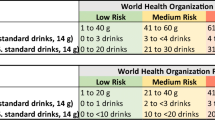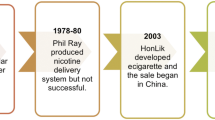Abstract
The vast majority of smokers are unable or unwilling to quit, but many are open to reducing smoking. No treatment options exist for these smokers besides medication-based therapies. Thus, this study investigated the efficacy of a cognitive behavioral therapy (CBT) smoking reduction program, Smoke_less. A sample of 155 outpatient smokers aged 18–70 years was recruited at the Tobacco Dependence Outpatient Clinic of the Medical Center of the University of Munich, Germany, and randomly assigned to the experimental group (Smoke_less: four weekly CBT group sessions and two telephone calls over 5 weeks, n = 51), active comparator group (one 15-minute counseling session, n = 49), or waiting control group (no intervention during the study, n = 55). The primary endpoint was a ≥50% smoking reduction in the intention-to-treat group 1 week and 6 months after the intervention. We evaluated also abstinence rates at follow-up. Significantly more participants in the Smoke_less group had reduced smoking ≥50% compared to the waiting group at 1 week [OR 7.59 (2.59–22.19)] and 6 months [OR 5.00 (1.68–14.84)] and compared to the active comparison group at 1 week [OR 8.58 (2.67–27.31)] but not at 6 months [OR 1.73 (0.71–4.20)]. We found no significant effects on abstinence rates. The CBT smoking reduction program Smoke_less is effective for smoking reduction but is superior to brief counseling only in the short term. Further research is required to improve its efficacy in long-term smoking reduction to provide a valid, non-medication-based alternative to smokers unable or unwilling to quit.
Trial Registration
Clinicaltrials.gov Identifier: NCT02337400.



Similar content being viewed by others
References
WHO (2014) Global status report on non-communicable dieseases 2014. http://apps.who.int/iris/bitstream/10665/148114/1/9789241564854_eng.pdf?ua=1. Accessed 21 Nov 2016
Statistisches Bundesamt (2013) Mikrozensus - Fragen zur Gesundheit - Rauchgewohnheiten der Bevölkerung 2013. Im Internet: https://www.destatis.de/DE/Publikationen/Thematisch/Gesundheit/Gesundheitszustand/Rauchgewohnheiten5239004139004.pdf?__blob=publicationFile. Accessed 19 Nov, 2016
Wewers ME, Stillman FA, Hartman AM, Shopland DR (2003) Distribution of daily smokers by stage of change: Current Population Survey results. Prev Med 36:710–720
Glasgow RE, Gaglio B, France EK, Marcus A, Riley KM, Levinson A, Bischoff K (2006) Do behavioral smoking reduction approaches reach more or different smokers? Two studies; similar answers. Addict Behav 31:509–518. doi:10.1016/j.addbeh.2005.05.039
Rüther T, Eberhardt K, Kiss A, Pogarell O (2014) Reduziertes Rauchen: Was können Interventionen erreichen und wie sollten sie gestaltet sein? Suchttherapie 15:179–186. doi:10.1055/s-0034-1390490
Begh R, Lindson-Hawley N, Aveyard P (2015) Does reduced smoking if you can’t stop make any difference? BMC Med 13:1–5. doi:10.1186/s12916-015-0505-2
Lee PN, Forey BA, Coombs KJ (2012) Systematic review with meta-analysis of the epidemiological evidence in the 1900s relating smoking to lung cancer. BMC Cancer 12:385. doi:10.1186/1471-2407-12-385
Forey BA, Thornton AJ, Lee PN (2011) Systematic review with meta-analysis of the epidemiological evidence relating smoking to COPD, chronic bronchitis and emphysema. BMC Pulm Med 11:36. doi:10.1186/1471-2466-11-36
Keil U, Liese AD, Hense HW, Filipiak B, Doring A, Stieber J, Lowel H (1998) Classical risk factors and their impact on incident non-fatal and fatal myocardial infarction and all-cause mortality in southern Germany. Results from the MONICA Augsburg cohort study 1984-1992. Monitoring trends and determinants in cardiovascular diseases. Eur Heart J 19:1197–1207
Pisinger C, Godtfredsen NS (2007) Is there a health benefit of reduced tobacco consumption? A systematic review. Nicotine Tob Res 9:631–646. doi:10.1080/14622200701365327
Gerber Y, Myers V, Goldbourt U (2012) Smoking reduction at midlife and lifetime mortality risk in men: a prospective cohort study. Am J Epidemiol 175:1006–1012. doi:10.1093/aje/kwr466
Hughes JR, Carpenter MJ (2006) Does smoking reduction increase future cessation and decrease disease risk? A qualitative review. Nicotine Tob Res 8:739–749. doi:10.1080/14622200600789726
Tverdal A, Bjartveit K (2006) Health consequences of reduced daily cigarette consumption. Tob Control 15:472–480. doi:10.1136/tc.2006.016246
Hart C, Gruer L, Bauld L (2013) Does smoking reduction in midlife reduce mortality risk? Results of 2 long-term prospective cohort studies of men and women in Scotland. Am J Epidemiol 178:770–779. doi:10.1093/aje/kwt038
Stead LF, Lancaster T (2007) Interventions to reduce harm from continued tobacco use. Cochrane Database Syst Rev. doi:10.1002/14651858.CD005231.pub2
Lindson-Hawley N, Hartmann-Boyce J, Fanshawe TR, Begh R, Farley A, Lancaster T (2016) Interventions to reduce harm from continued tobacco use. Cochrane Database Syst Rev 10:CD005231. doi:10.1002/14651858.CD005231.pub3
Asfar T, Ebbert JO, Klesges RC, Relyea GE (2011) Do smoking reduction interventions promote cessation in smokers not ready to quit? Addict Behav 36:764–768. doi:10.1016/j.addbeh.2011.02.003
Moore D, Aveyard P, Connock M, Wang D, Fry-Smith A, Barton P (2009) Effectiveness and safety of nicotine replacement therapy assisted reduction to stop smoking: systematic review and meta-analysis. BMJ 338:b1024. doi:10.1136/bmj.b1024
Hughes JR, Rennard SI, Fingar JR, Talbot SK, Callas PW, Fagerstrom KO (2011) Efficacy of varenicline to prompt quit attempts in smokers not currently trying to quit: a randomized placebo-controlled trial. Nicotine Tob Res 13:955–964. doi:10.1093/ntr/ntr103
Wu L, Sun S, He Y, Zeng J (2015) Effect of smoking reduction therapy on smoking cessation for smokers without an intention to quit: an updated systematic review and meta-analysis of randomized controlled. Int J Environ Res Public Health 12:10235–10253. doi:10.3390/ijerph120910235
Thorndike FP, Friedman-Wheeler DG, Haaga DAF (2006) Effect of cognitive behavior therapy on smokers’ compensatory coping skills. Addict Behav 31:1705–1710. doi:10.1016/j.addbeh.2005.12.005
Glasgow RE, Gaglio B, Estabrooks PA, Marcus AC, Ritzwoller DP, Smith TL, Levinson AH, Sukhanova A, O’Donnell C, Ferro EF, France EK (2009) Long-term results of a smoking reduction program. Med Care 47:115–120. doi:10.1097/MLR.0b013e31817e18d1
Estabrooks PA, Gaglio B, Morse EF, Smith T, Edwards A, Glasgow RE (2010) Defining and understanding success at smoking reduction: a mixed-methods study. Addict Behav 35:1113–1119. doi:10.1016/j.addbeh.2010.08.006
Gelkopf M, Noam S, Rudinski D, Lerner A, Behrbalk P, Bleich A, Melamed Y (2012) Nonmedication smoking reduction program for inpatients with chronic schizophrenia: a randomized control design study. J Nerv Ment Dis 200:142–146. doi:10.1097/NMD.0b013e3182438e92
Bernard PP, Esseul EC, Raymond L, Dandonneau L, Xambo JJ, Carayol MS, Ninot GJ (2013) Counseling and exercise intervention for smoking reduction in patients with schizophrenia: a feasibility study. Arch Psychiatr Nurs 27:23–31. doi:10.1016/j.apnu.2012.07.001
Tang YY, Tang R, Posner MI (2013) Brief meditation training induces smoking reduction. Proc Natl Acad Sci USA 110:13971–13975. doi:10.1073/pnas.1311887110
West R, McNeill A, Raw M (2000) Smoking cessation guidelines for health professionals: an update. Thorax 55:987–999
Fiore M, Jaen CR, Baker T, Bailey W, Benowitz N, Curry Se, emsp14, al, Dorfman S, Froelicher E, Goldstein M, Healton C (2008) Treating tobacco use and dependence: 2008 update. US Department of Health and Human Services, Rockville, MD
Fiore MC, Bailey WC, Cohen SJ, Dorfman SF, Goldstein MG, Gritz ER, Heyman RB, Jaén CR, Kottke TE, Lando HA, Mecklenburg RE, Mullen PD, Nett LM, Robinson L, Stitzer ML, Tommasello AC, Villejo L, Wewers ME (2008) Treating tobacco use and dependence. A clinical practice guideline. U.S. Department of Health and Human Services, Rockville, MD
Dt. Ges. f. Suchtforschung und Suchttherapie DGfPPuN (ed) (2004) Tabakbedingte Störungen: „Leitlinie Tabakentwöhnung“, Leitlinien der Dt. Ges. f. Suchtforschung und Suchttherapie (DG-Sucht) und der Dt. Ges. f. Psychiatrie, Psychotherapie und Nervenheilkunde (DGPPN)
Heatherton TF, Kozlowski LT, Frecker RC, Fagerstrom KO (1991) The Fagerstrom Test for Nicotine Dependence: a revision of the Fagerstrom Tolerance Questionnaire. Br J Addict 86:1119–1127
Ackenheil M, Stotz-Ingenlath G, Dietz-Bauer R (1999) M.I.N.I. Mini International Neuropsychiatric Interview. German Version 5.0.0. DSM-IV. In, München
Koegelenberg CFN, Noor F, Bateman ED, Zyl-Smit RNV, Bruning A, O’Brien JA, Smith C, Abdool-Gaffar MS, Emanuel S, Esterhuizen TM, Irusen EM (2014) Efficacy of varenicline combined with nicotine replacement therapy vs varenicline alone for smoking cessation: a randomized clinical trial. JAMA 312:155–161. doi:10.1001/jama.2014.7195
Faul F, Erdfelder E, Lang AG, Buchner A (2007) G*Power 3: a flexible statistical power analysis program for the social, behavioral, and biomedical sciences. Behav Res Methods 39:175–191
IBM (2015) IBM SPSS Statistics. Version 23, Armonk, NY
Moher D, Hopewell S, Schulz KF, Montori V, Gøtzsche PC, Devereaux PJ, Elbourne D, Egger M, Altman DG (2010) CONSORT 2010 Explanation and Elaboration: updated guidelines for reporting parallel group randomised trials. BMJ. doi:10.1136/bmj.c869
Cohen A (1988) Statistical power analysis for the behavioral sciences. Erlbaum, Hillsdale
Batra A, Mühlig S, Kröger C, Ratje U, Andreas S, Rüther T, Schweizer C, Thürauf N, Ulbricht S, Bartsch G, Lindinger P, Jähne A, Gohlke H, Effertz T, Pötschke-Langer M, Petersen KU, Neumann T (2016) S3-Leitlinie Screening, Diagnostik und Behandlung des schädlichen und abhängigen Tabakkonsums. http://www.dg-sucht.de/fileadmin/user_upload/pdf/leitlilnien/AWMF_76-006_S3-Leitlinie_Tabak.pdf. Accessed 21 Nov 2016
Stead LF, Bergson G, Lancaster T (2008) Physician advice for smoking cessation. Cochrane Database Syst Rev. doi:10.1002/14651858.CD000165.pub3
Roethlisberger FJ, Dickson WJ (2003) Management and the worker. Psychology Press, New York
Grawe K (1995) Changes in psychotherapy. Discussion comments on the contribution by Ulrike Hoffmann-Richter. Psychiatr Prax 22:37
Falba T, Jofre-Bonet M, Busch S, Duchovny N, Sindelar J (2004) Reduction of quantity smoked predicts future cessation among older smokers. Addiction 99:93–102. doi:10.1111/j.1360-0443.2004.00574.x
Broms U, Korhonen T, Kaprio J (2008) Smoking reduction predicts cessation: longitudinal evidence from the Finnish adult twin cohort. Nicotine Tob Res 10:423–427. doi:10.1080/14622200801888988
Klemperer EM, Hughes JR, Solomon LJ, Callas PW, Fingar JR (2016) Motivational, reduction, and usual care interventions for smokers who are not ready to quit: a randomized controlled trial. Addiction. doi:10.1111/add.13594
Acknowledgements
The authors thank Jacquie Klesing, Board-certified Editor in the Life Sciences (ELS), for editing assistance with the manuscript and Melanie Düerkop, and Marija Miros, (Tobacco Dependence Outpatient Clinic of the Medical Center of the University of Munich) for their help during the recruitment phase of the study.
Funding
The authors have no support or funding to report.
Author information
Authors and Affiliations
Corresponding author
Ethics declarations
Conflict of interest
T Rüther has been a consultant for, received grant/research support and honoraria from and been a speaker for or on the advisory board of Johnson & Johnson, and Pfizer. O. Pogarell has been on the advisory board of Lundbeck and received speaker’s honoraria from Lundbeck, Desitin, and Otsuka. A. Kiss, K. Eberhardt, A. Linhardt and C. Kröger declare no conflicts of interest.
Electronic supplementary material
Below is the link to the electronic supplementary material.
Rights and permissions
About this article
Cite this article
Rüther, T., Kiss, A., Eberhardt, K. et al. Evaluation of the cognitive behavioral smoking reduction program “Smoke_less”: a randomized controlled trial. Eur Arch Psychiatry Clin Neurosci 268, 269–277 (2018). https://doi.org/10.1007/s00406-017-0818-6
Received:
Accepted:
Published:
Issue Date:
DOI: https://doi.org/10.1007/s00406-017-0818-6




